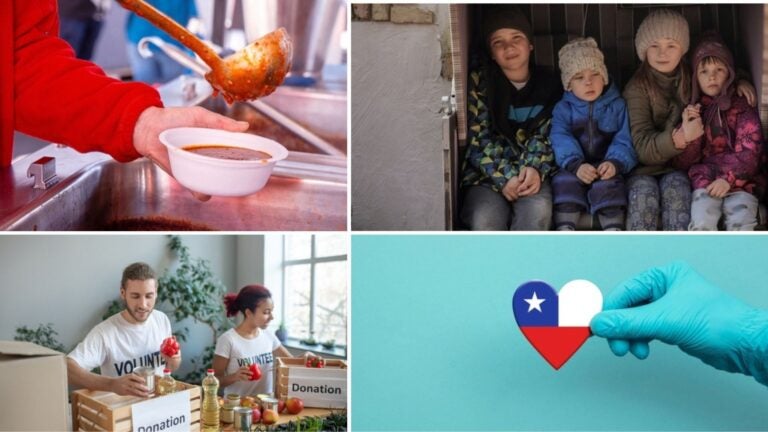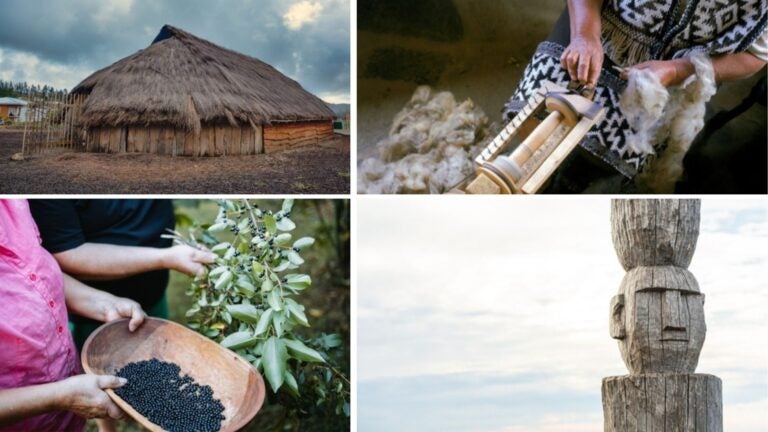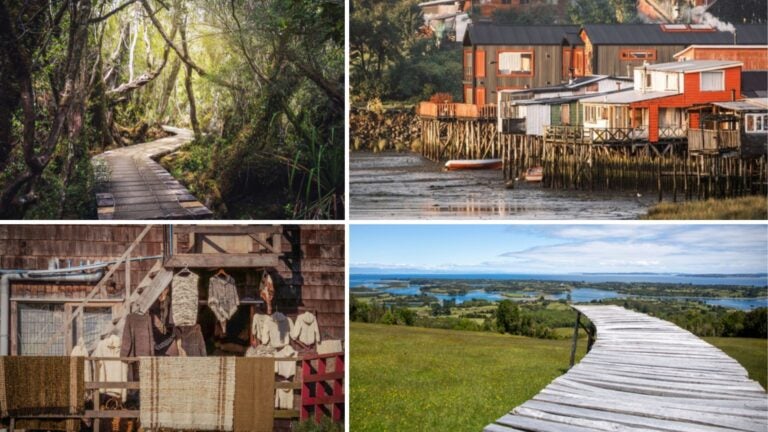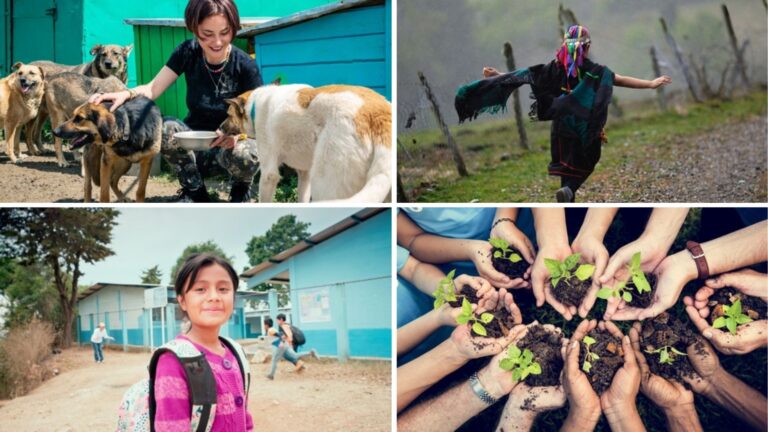Volunteering in Chile: Get ready to go
Discover what you need to know about volunteering in Chile, a vast, diverse country full of contrasts. Keep reading!
Extreme, diverse and full of contrasts, Chile impresses not only for its geography, stretching from the driest desert on Earth to the Patagonian glaciers, but also for the social and environmental challenges it faces. Although it’s one of South America’s most stable countries, it still struggles with deep economic inequality, limited access to education in rural areas, cultural tensions with Indigenous communities and, in recent years, the impacts of climate change and forced migration. In this context, volunteering in Chile plays a crucial role.
When you volunteer, you become part of local community efforts, helping drive sustainable development and strengthening social networks in places where government support does not always reach. There are volunteering opportunities all across Chile, from busy cities like Santiago and Valparaíso to small and remote communities in the north and south.
Here’s everything you need to know before volunteering in Chile. With this in mind, you can get ready to make a meaningful contribution in a country that is as fascinating as it is complex.
What do I gain from volunteering in Chile?
Getting involved in a cause is rewarding in itself, but the benefits go much further. You will not only connect directly with a diverse society full of contrasts, but you will also have an experience that enriches you on a personal, professional and cultural level.
If you are wondering what you will gain, one of the biggest rewards is the direct connection with communities facing real challenges. You may work with neighborhoods that need educational support, recently arrived migrants, Indigenous groups working to preserve their identity or rural areas where infrastructure is still limited. Being this close not only lets you contribute, it also gives you the chance to understand from the inside how social issues are experienced in a South American country that is undergoing major changes.
It is also a great opportunity for anyone looking to develop soft skills such as empathy, conflict resolution, teamwork and intercultural communication. Many programs provide initial training or ongoing support, which helps you take your social commitment to a more professional level.
On a personal level, volunteering in Chile gives you the chance to experience some of the most breathtaking landscapes imaginable. From the Atacama Desert in the north to the glaciers of Patagonia in the south, and including mountains, lakes, volcanoes, and the Pacific coast, the country is full of natural wonders. If your project is in a rural or protected area, you’ll enjoy an unmatched immersion in nature.
Finally, being part of local and international support networks is an experience not to be underestimated. Many organizations bring together volunteers from around the world, making it a chance to build friendships, share cultures, and open new personal and professional opportunities.

What are the general requirements for volunteering in Chile?
If you are considering joining a volunteering program in Chile, it’s important to know what conditions and documents you will need. While many projects are flexible and welcome people from diverse backgrounds, there are some common requirements that most organizations share.
Minimum age
Most programs require volunteers to be at least 18 years old when they start. Some accept younger participants, but only if they are accompanied by an adult or are part of an educational group.
Visa or entry permit
Most travelers from Latin America and Europe can visit Chile without a visa for up to 90 days. Within that time, you can take part in volunteer activities without receiving payment.
However, if the program is longer or involves more formal activities, some organizations may require you to obtain a special temporary residency permit for volunteering. To avoid any issues, it’s best to check with both the NGO and the Chilean consulate in your country before you travel.
Medical or travel insurance
Almost all programs require you to have international health insurance that covers medical care, accidents, and repatriation. Some organizations also ask that the insurance includes coverage for COVID-19 and preexisting conditions.
Language
Although Spanish is the official language in Chile, many programs welcome volunteers who only speak English, especially those listed on platforms like Workaway or Worldpackers. Still, having at least a basic level of Spanish is always a plus, particularly when connecting with local communities.
Additional documentation
In addition to the requirements mentioned above, you must submit the following documents:
- Valid passport (or identity card, if you are a Mercosur citizen)
- Certificate of criminal record (may be requested for volunteer work with minors)
- Registration form and motivation letter
- Copy of insurance policy
Personal profile and motivation
Beyond paperwork, what organizations in Chile value most is a committed attitude, empathy, and a willingness to learn and adapt to new environments. You don’t need to be an expert in a specific field, but you do need a genuine desire to make a difference.
Keep in touch easily with Holafly
While it’s not required, having a Holafly eSIM for Chile can make your volunteer trip much easier. It lets you stay online throughout your project without relying on local WiFi, giving you unlimited internet without roaming charges or the hassle of buying a local SIM.
If you plan to stay in Chile for a few months after your volunteer work, working remotely while exploring the country’s many wonders, Holafly Plans are a great choice. Their monthly plans work like a subscription that automatically renews, and you can cancel it anytime without fees or extra charges. You just choose between a limited data plan (25 GB) or unlimited, and enjoy a reliable connection in Chile and over 170 countries worldwide.
What are the best volunteer programs in Chile?
Chile offers a wide range of volunteer programs, from the urban areas of Santiago to the more remote regions in the north and south. What’s great is that these projects are well organized, with clear information and established logistics, giving volunteers a sense of security and confidence.
Below, you’ll find opportunities in education, community development, and environmental work, each with its own features, duration, requirements, and costs. Be sure to check the details for each organization carefully and reach out to them directly before signing up.
1. United Planet’s “Children and Education” program in Santiago
The “Children and Education” program by United Planet in Santiago focuses on working with schools, youth centers, and community projects that support the learning of children and teenagers in vulnerable situations.
This program seeks volunteers to support classroom activities, help students improve their English, organize fun learning games, and take part in extracurricular workshops with seventh and eighth graders. Being based in Santiago, the capital, makes getting around and finding accommodation much easier.
- General requirements: You need to be over 18, have at least a basic level of Spanish or be willing to learn, and apply at least 60 days in advance.
- Program duration: Programs last from one to twelve weeks. Volunteer placements start every Sunday, running from the third week of March through November, except during the school holidays in July.
- What does it include? Accommodation with host families, local guidance, health insurance, some cultural immersion activities, airport transfer, and the option to add paid Spanish classes.
- What is not included? Airfare, daily transportation costs.
- Price: The cost of the fee varies, but this organization describes the program as active year-round and starting on Sundays.
- What will your tasks be? Assist the local teacher, prepare class materials, provide support to individual students or small groups, lead conversational English activities, and help out with school events. You will also have free time to explore the city and its surroundings.
2. Adventure Volunteer educational volunteer program with Mapuche families in Kurarewe (La Araucanía Region)
Adventure Volunteer offers a cultural immersion project working directly with Mapuche communities in the Kurarewe area, about 140 kilometers from Temuco in the La Araucanía region.
Volunteering here means living with Mapuche families in a rural community and taking part in everyday life, from gardening and feeding animals to cooking and helping around the house. It’s a chance to immerse yourself in Mapuche culture and traditions while making a meaningful contribution to the families’ daily lives.
- General requirements: You should be over 18, show respect for the local culture, be adaptable to rural life, and be committed to the assigned schedule.
- Duration: The program lasts between one and four weeks. You can start at any time, although organizers recommend joining between November and April because of field conditions.
- Price: $490 for two weeks.
- What is included? Accommodation with Mapuche families, three meals a day, ongoing support from the organization, a certificate of participation, and more.
- What is not included? Airfare, airport transfer, visa (if necessary), travel insurance, among others.
- What will your tasks be? Help out in the family garden, feed the animals, assist in the kitchen, take part in household chores, and respectfully engage in daily family life.

3. Animal rescue and care volunteer program in Santiago by Volunteer World
Another exciting volunteering opportunity in Chile is the dog rescue, care, and rehabilitation project run by Volunteer World. The program targets volunteers who want to work in urban shelters, helping clean, feed, walk, and socialize the dogs, as well as maintain the shelter.
The goal of the program is to care for dogs and cats until they find loving homes. It’s an ideal volunteering opportunity for animal lovers who want to contribute to a cause that is both meaningful and much needed.
- General requirements: 18 years old or older and a commitment of at least two weeks.
- Price: $300 per week.
- What is included? The program provides shared accommodation (depending on your choice), pickup from Santiago de Chile Airport, an initial orientation, basic insurance, and local transportation to the shelter.
- What is not included? Food and drinks, airfare, medical insurance, and vaccinations.
- What will your tasks be? During the volunteer program, you will help run the shelter’s daily operations, learn about animal welfare, work directly with the animals, and support the local team as they improve the animals’ living conditions.
4. Wildlife and Nature Volunteer Projects – Chile Inside (Chiloé, Lake District)
This program focuses on environmental conservation and animal care in rural areas of southern Chile, particularly on the Lacuy Peninsula in Chiloé Island. Offered by Chile Inside, volunteers work on eco-farms, nature reserves, or animal rescue centers, engaging directly with the local environment and wildlife.
It’s a great option for those looking to step away from city life and actively contribute to sustainable projects in a remote yet well-organized setting.
- General requirements: Volunteers should be over 18, in good physical condition, enjoy outdoor life, and have an interest in sustainability. No prior experience is required.
- Duration: 2 weeks to several months.
- What does it include? On-site accommodation, an initial orientation, ongoing support during your stay, and involvement in all activities. Depending on the center, meals may also be provided.
- Price: From $1,250 for four weeks. The price varies depending on the duration.
- What will your tasks be? Feed the animals, harvest produce from the garden, assist with maintenance tasks, and take part in community environmental awareness activities.

5. Support for Migrants and Refugees Program – Volunteer World (Santiago)
With Chile having welcomed a large number of migrants in recent years, this program focuses on supporting and integrating migrant and refugee communities. Volunteer World runs the project in Santiago and other urban areas where social services are limited.
This program is perfect for volunteers with intercultural awareness who want to teach languages or simply help newcomers adapt to life in a new country. Your role will involve supporting day centers or shelters, teaching basic English, organizing cultural activities, assisting with administrative tasks, and helping create community spaces for integration.
- General requirements: Over 18 years old, basic level of Spanish, adaptability, social awareness.
- Duration: From two weeks to three months.
- What does it include? Shared accommodation, initial orientation, support from the local team, and access to the volunteer center.
- Price: From $280/week (depending on duration and type of accommodation).
- What will your tasks be? Attend classes or workshops, lead recreational activities, assist with basic administrative tasks, provide emotional support, and help create trusting spaces that foster integration.
What types of volunteer projects are available in Chile?
Chile is a country of striking geographic and social contrasts, where diversity is reflected not only in the landscape but also in the lives of its communities. While it is one of Latin America’s strongest economies, inequality remains a challenge, especially in rural areas, marginalized urban neighborhoods, and Indigenous regions.
There is a wide variety of volunteer projects in Chile. The most common include educational programs in vulnerable communities, support for the elderly or people experiencing homelessness, assistance with migrant and refugee initiatives, environmental conservation work in national parks, and projects connected to the Mapuche people or the preservation of local cultural heritage.
1. Education and tutoring
One of the most common types of volunteering in Chile is in education. Programs are available both in Santiago and in smaller towns, looking for volunteers to help children and teenagers with schoolwork, teach English, or provide extra support in core subjects like math.
Providing educational support in public schools in disadvantaged areas can have a real impact. Volunteers can also get involved in extracurricular activities that promote emotional growth, creativity, and sports.
2. Working with indigenous communities
In southern Chile’s La Araucanía region, volunteers have the opportunity to engage directly with Mapuche communities. These programs offer a deep cultural immersion, allowing participants to live with local families and gain insight into their traditions, language, and daily life. Volunteers might help in gardens, support everyday household routines, work with children, or assist in community-led workshops.
3. Animal welfare and shelters
In cities, especially Santiago and Valparaíso, there are many organizations focused on rescuing and caring for abandoned animals, mainly dogs. Volunteers help out in shelters with cleaning, feeding, walking, and socializing the animals. Some programs also run adoption campaigns and raise awareness about responsible pet ownership.
4. Environment and conservation
Chile is home to a unique biodiversity, particularly in its national parks and nature reserves. In Chiloé Island and Patagonia, there are environmental conservation programs where volunteers help protect native species, plant trees, promote environmental education, or maintain animal rescue centers. It’s a great option for those looking to connect with nature and contribute to a project with a real ecological impact.
5. Support for migrants and refugees
In recent years, Chile has seen a growing migrant population, especially from Venezuela, Haiti, and Colombia. Programs in Santiago provide support through Spanish lessons, assistance with legal matters, job guidance, and emotional support. It’s a great opportunity for volunteers who are socially conscious and eager to connect cultures.

How much does it cost to volunteer in Chile?
Many people think of volunteering as a free experience, but in reality, volunteering in Chile, as in most countries, comes with some necessary and optional costs to keep in mind. On the plus side, it can also help reduce expenses that would normally be higher on a typical trip.
Read on for a detailed explanation:
Mandatory program costs
Most volunteer programs in Chile charge a participation or registration fee. This is not payment for your work, but rather a way to support the program’s operations and help cover some of the volunteer’s expenses.
| Concept | Approximate price | Common details |
| Registration fee | Between $100 and $250 | May include prior orientation, materials, and administrative management. |
| Program cost | From $200 to $1,200 per month | Varies depending on duration, type of volunteer work, location, and services included. |
| Medical/travel insurance | From $40 to $60 per month | In many cases, this is mandatory and must include general medical coverage. |
Many programs provide accommodation, whether in shared houses, hostels, or local residences, and sometimes meals as well. When these are not included, you will need to budget for them separately.
Variable costs
In addition to mandatory fees, there are personal expenses that will vary depending on your lifestyle, the city where the program takes place, and how you choose to spend your free time.
| Concept | Approximate price | Common details |
| Accommodation (if not included) | Between $250 and $500 | In cities such as Santiago or Valparaíso. Cheaper in rural areas. |
| Food (if not included) | Between $150 and $250 | Eating out is more expensive; cooking reduces costs. |
| Local transportation | $20 to $60 | The metro and bus network is accessible. May vary depending on location. |
| Tourist or cultural activities | Variable | Depends on the volunteer’s free time and interests. |
If you want to put together a budget for traveling to Chile as a volunteer, knowing how much it costs to live in the country can be very helpful.
What you will save by volunteering in Chile
Although volunteering involves some costs, it can also save you money. Many volunteers avoid typical tourist expenses like paying for full accommodations, eating out constantly, or booking guided tours. Instead, they experience a more authentic way of living, staying in shared housing, connecting directly with communities, and taking part in hands-on activities.
Volunteering also usually comes with a support network that can guide you on getting around the city, finding affordable shopping options, and making the most of your free time without overspending.
Frequently asked questions about volunteering in Chile
Yes, while you don’t always need basic Spanish, having it is a major plus, especially when you work with local communities. You can complete some programs in English, but in rural or educational settings, speaking Spanish helps a lot.
No. Volunteering is not paid work. However, many organizations provide accommodation, some meals, and included activities, which helps keep costs down. Volunteering is about exchange: you contribute your time and energy, and the organization gives you a meaningful life experience in return.
It depends on the program. Generally, programs expect volunteers to commit four to six hours a day, five days a week. In some rural or conservation projects, the days may be longer, but there are always free days to rest or explore.
Yes, many organizations accept group applications, as long as space is available. If you are traveling with someone, it’s best to mention it from the start so the organization can place you together in both your tasks and your accommodation.
It varies depending on the location and type of project. Some provide shared rooms in volunteer houses, others offer homestays or even private rooms. In rural areas, accommodations are often simpler, but still comfortable and clean.





 Language
Language 


















 No results found
No results found



